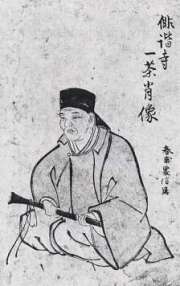|
Biografie Kobayashi Issa
Kobayashi Issa (1763-1828) a fost un poet japonez.
***
Kobayashi Issa (1763-1827) - original name Kobayashi Nobuyki - Also called Kobayashi Yataro, born in some sources on May 5, 1763
Kobayashi Issa was born in Kashiwabara, Shinano province (now part of Shinano Town, Nagano Prefecture), a son of a farmer. His father was widowed a few years after Issa was born. Issa was looked after by his grandmother until his father remarried. During this period, he started to study haiku under a local poet, Shimpo.
Issa's troubles with his stepmother started when she gave birth to a son. Later Issa complainen that he was beaten "a hundred times a day." In 1777, at the age of fourteen, he was sent by his father to Edo (Tokyo today), where he studied haiku under the poets Mizoguchi Sogan and Norokuan Chikua (died 1790). Possibly Issa also worked as a clerk at a Buddhist temple.
Issa's works gained the attention Seibi Natsume, who became his patron. Although his poems became more and more known, he was forced to travel and work hard until his fiftieth year. In 1792 he gave up the name Yataro and took the pen name Issa, Haikai-ji Nyudo Issa-bo (Temple of Haiku Lay Brother Issa). In one poem he said: "With spring's arrival, / Yataro becomes reborn / as Issabo". His earlier names included "Kobayashi Ikyo" and "Nirokuan Kikumei." After a journey in south-western Japan, he published a collection of verse, TABISHUI (1795). Issa lived at various places, including Kyoto, Osaka, Nagasaki, Matsuyama and other cities. He often also visited his home town.
Finally, after 13-year-long disputes with his stepmother and stepbrother, Issa was allowed to inherit the property that his father had long wanted him to have. In the early 1810s Issa returned to Kashiwabara, where he married a young woman and enjoyed the reputation of the leader of the haiku world in northern Shinano. In Diary of the Death of My Father the poet depicts the family disputes before his father's death - he died of typhoid fever. Even though the sick man was suffering he "smiled happily at the people who offered him poison and thought ill of anyone who tried to force medicine on him." His father died at the age of 65. The body was cremated according to the Buddhist rites and Issa collected the bones.
Issa was a prolific writer of both poetry and prose. He treated his subjects with humor, excelling particularly at affectionate portrayals of such creatures as fleas, frogs and sparrows. Issa's poems about animals and insects are learned by every schoolchild in Japan.
During his lifetime Issa wrote over 20,000 haiku, hundreds of tanka, and several works of baibun. Close observations of nature and passing but meaningful personal incidents have often melancholic mood. In poems based on his own life Issa often used words of the daily conversations. Village life is not seen as idyllic, but hard, especially during the winter: "Cold cold / In the eaves / Evening cidadas and red peppers."
Among Issa's famous works are CHICHI NO SHUEN NIKKI (1801), and Oragaharu (1819, tr. The Year of My Life), a poetic diary, where he records his life and his spiritual path, sad memories, the death of his beloved daughter, Sato, but also contemplates the cycles of nature: "But this poor tree has neither the strength to put forth fruits and flowers, nor the good fortune quite to die. Existence is a continuous struggle to remain simply one foot high." The Year of My Life was written during the relatively calm period in the poet's life. However, Issa's later years were filled with sorrows, when his wife and other children died and his property was destroyed by fire. His new wife came from a local samurai family, and left him after a few weeks of marriage. In 1826 he married for a third time. Issa died on November 19, 1827 in Kashiwabara (in some sources the date is January 5,1827).
***
å°æž— 一茶(ă“ă°ă‚„ă— ă„ă£ă•ă€å®æš¦13å¹´5月5日(1763å¹´6月15日)- 文政10å¹´11月19日(1828å¹´1月5日))ă¯ă€æ±Ÿæˆ¸æ™‚ä»£ă‚’ä»£è¡¨ă™ă‚‹ä¿³è«§å¸«ă®ä¸€äșșă€‚æœ¬åă‚’å°æž—å¼¥å¤ȘéƒŽă€‚
|




